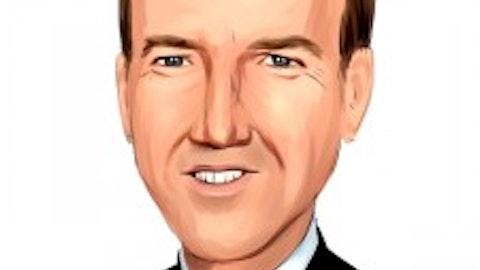The billionaire investor and George Soros‘ Protégé, Stanley Druckenmiller gave a presentation discussing the Federal Reserve’s interest rate policy on CNBC’s ‘Delivering Alpha Conference’ recently. After the presentation he was also interviewed by CNBC’s Joe Kernen on the same topic. Mr. Druckenmiller seemed cautious of how the Federal Reserve has kept interest rates at near 0 levels for an extended period of time.
“Today’s Fed Policy is as puzzling to me as during any of those periods and frankly rivals 2003 in the late stages to the early 2004 as the most baffling of the number of instances, I have in mind. We at Duquesne at that time were mystified why the funds rate was 1% with a ‘considerable period’ attached to it, given the vigorous economic growth statistics available at that time,” Druckenmiller said.
Mr. Druckenmiller went on to compare the current state of economy with that of 2003-04, when the jobs growth, industrial production and other economic indicators were showing the same levels of growth that they do now. However, he did so to highlight the fact that in 2003-04 the Fed has kept interest rates lower, similar to what it has been doing now and this extended period of keeping the interest low resulted in the financial crisis of 2007-2008.
To demonstrate that the Fed’s current interest rate policy doesn’t make sense he cited an interesting example of how in 2003-2004 he had asked his partners in his firm to look at some charts he had prepared of economic indicators and to imagine that they had been living on Mars for the last 5 years only to return right now, then guess the appropriate level of interest rate that the Fed should have kept. He revealed that most of his partners came with an answer higher than the 1% interest rate that the Fed was administering back then. During the course of his presentation, he also asked the audience to imagine the same thing right now, after looking at current economic indicators and compare their figures with the Fed’s current interest rate of nearly zero.
Druckenmiller believes that this ‘once in a century’ economic measures are not required five years into the recovery from the 2007-08 financial crisis. He cited economic history to explain that the current policies by the Federal Reserve are not only unnecessary but also fraught with unappreciated risks. According to him, when Ben Bernanke and other Fed officials instituted the QE in 2009, the economy was in a “dysfunctional meltdown” and the idea of going with a quantitative easing was not only brilliantly conceived but also had a good risk-reward attached to it, but the current economic policy neither makes any sense nor is good from a risk-reward perspective.
Druckenmiller was forthcoming in accepting that he doesn’t know if the current state of affairs will lead to another investment bust due to misallocation of resources, lead to inflation or the effects will just be benign. He also mentioned that if he doesn’t know what the likely outcome would be even the Fed doesn’t know it.
“Given the time, the resources, and efforts, policy makers have put forward to make sure we don’t experience another financial crisis from Dodd-Frank to recapitalizing the banks to other measures. Does it make any sense to double down on a monetary policy which many of us believe was the primary impetus or at least a significant contributor, leading up to the financial crisis,” Druckenmiller added.
Mr. Druckenmiller is considered an authority when it comes to the subject of mistakes made in creating economic policies, given that he was the person who along with George Soros, who made the famous bet against the British Pound in 1992 which netted them $1 billion in profits. We, at Insider Monke,y keep a close look at the changes he makes to his portfolio at Duquesne Capital. Some of his current top holdings include Google Inc (NASDAQ:GOOGL), Walgreen Company (NYSE:WAG), Microsoft Corporation(NASDAQ:MSFT), Teva Pharmaceutical Industries Limited (ADR) (TLV:TEVA), Alcoa Inc(NYSE:AA) and Adobe Systems Incorporated (NASDAQ:ADBE).
Disclosure:None






